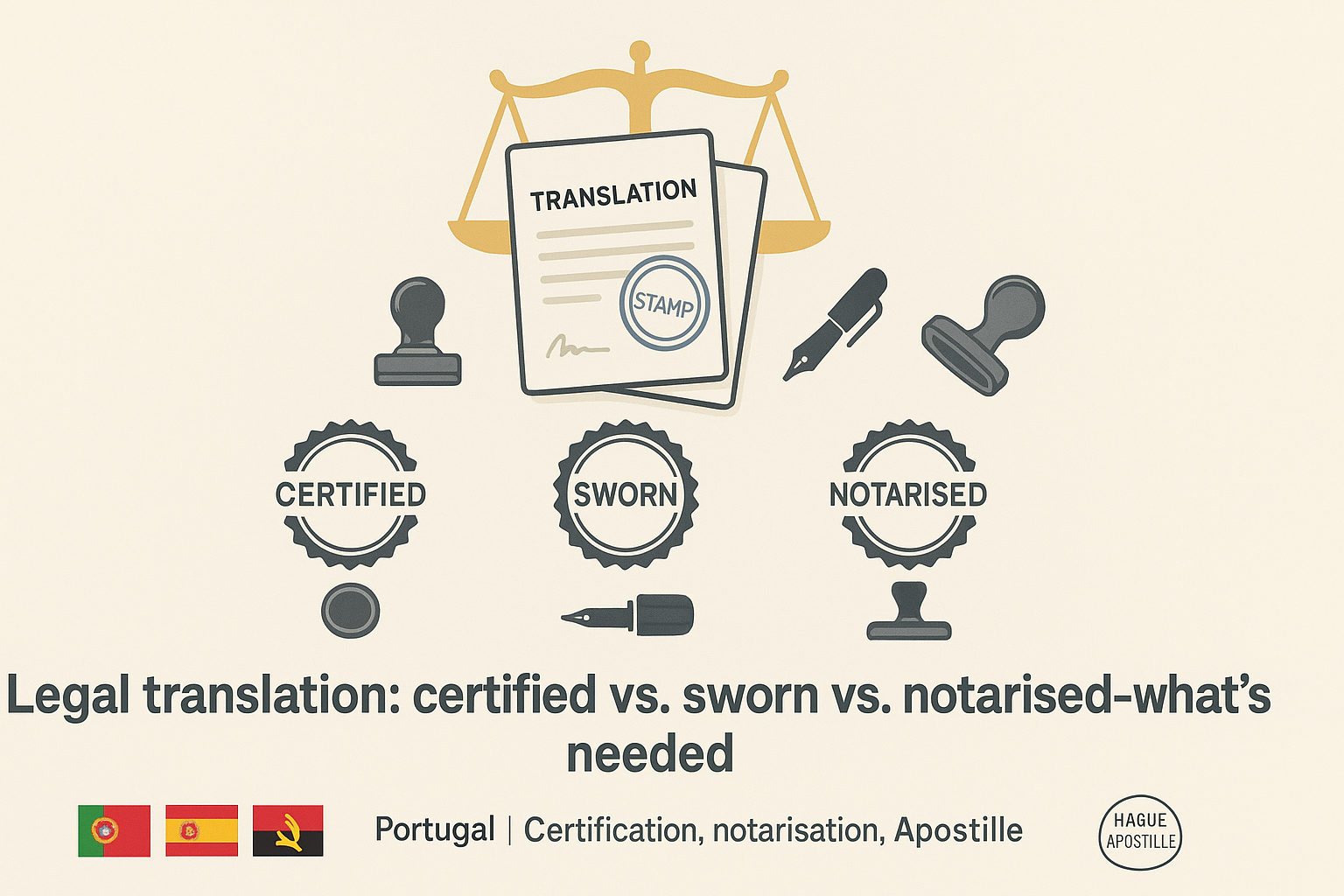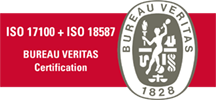Legal translation: certified vs. sworn vs. notarised—what’s needed
Legal translation in Portugal can require certification, notarisation, or an Apostille. This guide explains what each option means and when you actually need it.

Table of Contents
Legal translation in Portugal: how validation works
In Portugal, legal translation refers to subject matter—contracts, corporate documents, certificates, court filings—not a particular form of legalisation. What makes a translation “official” is the certification act that ties a translator’s declaration to your documents. If you only need an accurate rendering for negotiations or internal review, a specialist and review workflow may be enough; start by outlining scope through our legal translation service.
Portugal does not have a class of sworn translators. Instead, translations are usually certified before a lawyer (common) or a notary (when required by the receiving office). For filings within Portugal, the lawyer route is typical. For foreign use, the certification may need extra steps. If you are mapping a multi-country process, our translation services team can stage the right sequence across authorities.
Quality still matters. Complex transactions benefit from experienced legal linguists and robust QA. If your documents include technical annexes, consider pairing the legal work with our technical translation capability so terminology stays consistent across exhibits and contracts.
When legal translation must be certified or notarised
You will generally need certification when submitting translations to public bodies, courts, registries, banks or universities. The translator’s declaration is signed by a lawyer or notary and attached to the set (original or certified copy + translation + declaration). For day-to-day filings, we coordinate the act and bind the documents; learn how we manage hand-offs in our we translate the world overview.
Some authorities explicitly ask for a notarial act. That request does not change the translation itself; it changes the certifying authority and the instrument type. Where timelines are tight, we’ll advise on the fastest compliant path—and we stand behind it with our Zero Errors, Total Satisfaction commitment so you don’t have to re-file due to formality issues.
Spain vs. Portugal vs. Angola: different rules
Spain recognises sworn translators (“traductor-intérprete jurado”) appointed by the Ministry of Foreign Affairs. When filing in Spain, authorities commonly request a sworn translation with the translator’s seal. If your document was issued in Portugal for use in Spain, we’ll confirm whether a Portuguese certified translation plus Apostille will be accepted, or if you should commission a Spain-compliant sworn version (background reading: the official sworn translator register).
Portugal relies on certification before a lawyer or notary. There are no sworn translators. For domestic filings this is typically sufficient, and for cross-border use we may add an Apostille to the certification page. If you are unsure, our frequently asked questions page covers common acceptance patterns we see in practice.
Angola has no sworn translator category and is not in the Hague Apostille system. Translations are usually certified before a notary, and for cross-border effect the package goes through consular legalisation. We coordinate these steps alongside your project plan so the sequence is clear and lead times are realistic.
International authentication: Apostille or consular route
Between Hague members, an Apostille authenticates the signature or seal of the certifying authority; it does not certify translation content. In Portugal, Apostilles are handled by competent authorities such as the Prosecutor General’s Office—see the PGR Apostille guidance for scope and locations. We obtain the Apostille after certification and bind it to the set.
For countries outside the Hague system (e.g., Angola), the translation must follow a consular legalisation route via the destination country’s channels. If you are comparing routes, the HCCH Apostille overview explains when an Apostille replaces consular steps among member states. Tell us the destination authority, and we’ll plan the right lane in your service confirmation.
Typical scenarios and quick choices
Portuguese registry filing (domestic use). Commission certification before a lawyer; add a notarial act only if the registry asks for it. For document families that include specs or drawings, combine with technical translation support to keep annexes aligned.
Spanish immigration or academic use. Many Spanish authorities ask for a sworn translation. Depending on the case, a Portuguese certification plus Apostille might be accepted; we’ll confirm requirements against the MAEC guidance and propose the least duplicative path. To scope time and cost accurately, start through our contact & quote form.
Documents circulating with Angola. Plan for notarial certification and consular legalisation rather than an Apostille. We document each step and keep you informed in your client updates so internal stakeholders can schedule filings and signatures with confidence.
How we minimise re-work. We clarify acceptance rules up front, apply the correct certification, then add Apostille or consular legalisation as needed. Our continuous improvement process captures authority feedback so future filings go faster.
FAQ
Q1. Is legal translation the same as certified or sworn?
No. Legal translation is the subject area (law-related content), while certified and notarised describe how Portugal formalises the translator’s declaration so public bodies can rely on it. The certification page is attached to your documents and binds the set for official use.
Sworn is a Spanish category: sworn translators are appointed by the Ministry and stamp the translation with an official seal. Portugal doesn’t have sworn translators. For cross-border use, we may add an Apostille to the certification page or follow a consular route. When in doubt, tell us the destination authority and we’ll map the most efficient sequence so you don’t repeat steps later.
Q2. When do I need a Hague Apostille for a translation done in Portugal?
Add an Apostille when the translation’s certification page will be presented in a Hague member country and the receiving authority asks for it. The Apostille authenticates the signature or seal of the Portuguese lawyer or notary who certified the translation; it does not attest to the content itself.
If the destination is outside the Hague system, you’ll likely need consular legalisation instead. We handle both tracks routinely—first certifying the translation, then either obtaining the Apostille or arranging consular steps—so the final set is accepted without extra trips.
Q3. What changes for Angola?
Because Angola is not part of the Apostille Convention, you cannot use an Apostille to shortcut legalisation. Translations are generally certified before a notary, and the package then follows consular legalisation via the Angolan channels. For documents originating in Angola that will be used in Portugal, the sequence mirrors this path: local legalisation first, then translation and certification for Portugal.
We will flag any document-specific nuances (e.g., powers of attorney, academic records) and reflect them in your proposal so you understand timing, costs, and who needs to sign what at each stage.
Q4. Does Spain always require a sworn translation?
Often, yes, when filing with Spanish public bodies. Spain’s system relies on sworn translators appointed by the Ministry; their seal gives the translation official status within Spain. However, for multinational workflows we may mix approaches—for example, a Portuguese certification plus Apostille for a Hague-member destination, or a Spain-compliant sworn translation when that is explicitly required.
Provide the receiving authority’s name and the country of use, and we’ll recommend the route that avoids duplication while meeting formal requirements the first time.
Image Suggestion (not published)
- Concept: A clean desk with a stamped certification page, a notary seal, and a passport—neutral background, natural light.
- Alt text: Certification page attached to a legal translation with lawyer and notary seals.
- Suggested filename: legal-translation-certification-notary-apostille.jpg
Links
- Internal:
- External:

